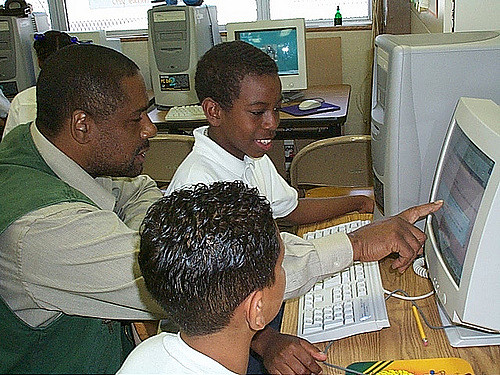Accountability like sh*t flows downhill. And accountability talk from policymakers and shills is like the halftime at a Raiders game after too many tailgate tacos.
It’s teacher appreciation week, so let’s actually appreciate the lifeblood of schools, and give them a break. The current accountability talk, misses the soul of a school and teacher, and hurts rather than helps. And rather than crafting more whips to crack, we need to lighten the increasing load of teachers so they can get back to educating.
In an increasingly complex job with an ever expanding set of mandates and masters, teaching is extremely challenging, and less fun. At least in the schools I see, I don’t see anyone kicking back and reading the paper. I see some teachers struggling, exasperated at times, overwhelmed by need, but everyone is trying to dig themselves out of that hole, they may not have the tools or support but they are trying.
“I feel like a failure”
Nobody I know who teaches, went into it because it was easy or lucrative. The motivation of educators at least 95% of the time is to help students. It’s not to have an easy life, or easy job, or giant paycheck with summers off. It’s to help.
When our teachers saw their student’s scores on the new common core exams—they were crushed, “I feel like a failure” one moaned. They don’t need some third party that has never been to the school to hold them “accountable.”
And in my younger days I was that “accountability” guy.
Of course teachers should be judged on student test scores. In theory…maybe…but in reality, in this world? In NY a politically and monetarily costly battle to include test scores in evaluations has been pulled back largely due to errors in implementation. And while these systems make hypothetical sense, the reality is much more challenging.
The research is mixed at best. First, there are large year to year differences in test score gains even with the same teachers, which should just make us pause. Second, the research around pay for performance and its effects on learning and the educational experience, is not necessarily positive. Certainly nowhere near the political enthusiasm.
Teaching is getting harder
The bar on what children need to know and be able to do has been abruptly raised by the common core curriculum. The children are also, more diverse, and I think bringing more issues and trauma to the schools. And teachers are meant to be counselor, nurse, data specialist, special needs expert, family outreach worker, restorative justice coordinator, translator, and educator, with new roles, reports, and responsibilities mandated monthly.
The same teachers have become scapegoats in the debate, for our failure to give students the supports they need to be successful. In this context it’s not surprising that we have a current teacher shortage in CA, with an even larger one looming, particularly for high need specialties.
Real Teacher Appreciation
If we really want to appreciate teachers, as I am sure everyone will say they are, then let’s spend some time thinking concretely about how we can make teaching better, more fun, more sustainable, more supported, and more impactful.
I have one idea, well it’s not my idea.
What is the most miserable time for teachers that recurs several times each year? It’s grading.
Getting grades in and completing grade books is a quarterly or triannual tooth pulling. Teachers scrambling to compile grades for 40 homework assignments that were copied in breakfast, and include a plethora of measures that are not really related to student learning, and likely unintentionally harbor bias of one type of another (like behavior and class participation). This is ripe for simplification and reform.
A recent blog by Joe Feldman of Crescendo Education Group is a great starting point describing that firm’s work in reforming grading with teachers,
They learn the benefits of grading on a 1-4 scale instead of a 100-point scale, not awarding extra credit, considering the most recent performance as opposed to averaging scores, and separating academic mastery from behaviors and subjective judgments. They consider more effective ways to give feedback, and how using grading as a classroom management strategy (“I’ll subtract points from your final if you misbehave”) undercuts learning and undermines equity. In the best situations, teachers learn through collaborative action research; they test alternate grading practices in their classrooms, share results with colleagues and repeat the cycle throughout the year.
I challenge others reading this on Teacher Appreciation Week, to drop the speech, and to think about how we actually honor and support educators. Rather than adding one more mandate, what can we take away to allow them to effectively teach. Isn’t that what we all want.

